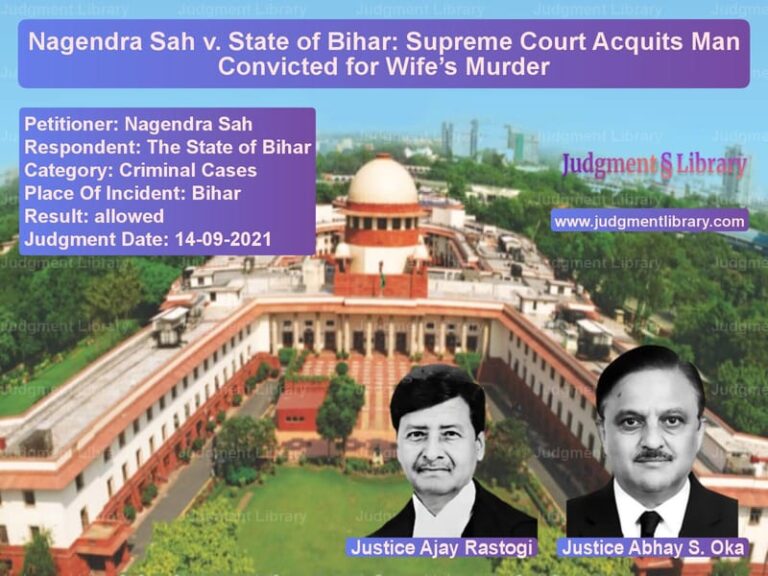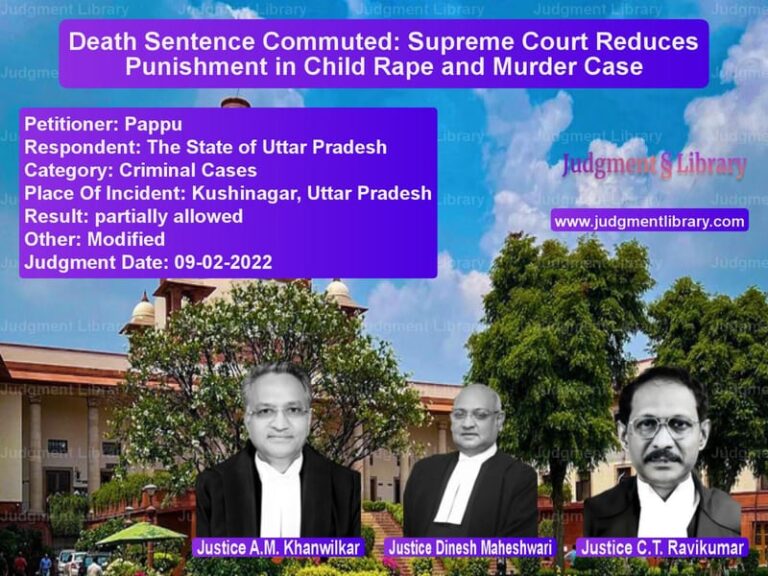Motor Accident Claims: Supreme Court’s Judgment on Compensation and Liability in Fatal Accident Case
This case revolves around the appeal against the judgment of the Rajasthan High Court, where the compensation awarded to the appellants for the death of their family member in a road accident was challenged. The petitioner, Anita Sharma and others, were seeking compensation following the tragic death of Sandeep Sharma, who was killed in a car accident caused by the rash driving of Sanjeev Kapoor, the owner and driver of the vehicle. The respondents in the case were The New India Assurance Co. Ltd. and others, and the main issue revolved around the apportionment of compensation and the liability of the insurance company.
Background of the Case
The accident occurred on 25th March 2009 when Sandeep Sharma was travelling in a car driven by Sanjeev Kapoor. The vehicle collided with a truck near Ghazipur, Uttar Pradesh, resulting in multiple injuries. Sandeep was initially hospitalized but later succumbed to his injuries. His dependents, including his widow, children, and mother, filed a claim petition seeking compensation for the loss of Sandeep’s life and livelihood. The claim was filed against the car owner, Sanjeev Kapoor, and his insurance company, The New India Assurance Co. Ltd.
The Motor Accident Claims Tribunal initially awarded compensation of Rs. 16,08,000. However, both the insurance company and the appellants appealed the decision before the Rajasthan High Court. The High Court set aside the Tribunal’s award and dismissed the claim petition, leading to this Supreme Court appeal.
Petitioner’s Arguments
The petitioners, represented by their counsel, presented the following arguments:
- Liability of the Driver: The petitioners argued that the accident was caused by the rash and negligent driving of Sanjeev Kapoor, the driver of the car. They contended that Kapoor’s actions directly contributed to the death of Sandeep Sharma, and hence, liability for the accident rested on him.
- Delay in Filing FIR: The petitioners disputed the High Court’s conclusion that the FIR was filed late. They argued that the delay was a result of the severity of the accident and the immediate medical attention required for the victims.
- Incorrect Disbelief of Eyewitness: The petitioners contested the High Court’s disbelief of the eyewitness, Ritesh Pandey, and argued that his testimony was crucial for establishing the events surrounding the accident. They maintained that the eyewitness was not personally motivated and was simply trying to help the injured victims.
Respondent’s Arguments
The respondents, including the insurance company and the car owner, presented the following defenses:
- Responsibility of the Truck Driver: The respondents argued that the truck driver was the actual cause of the accident. They contended that the truck was driving rashly and at high speed, and it collided with the car, leading to the injuries and death of Sandeep Sharma. The respondents maintained that the fault lay with the truck driver and not the car driver.
- Discrepancies in the Eyewitness Testimony: The respondents contended that the testimony of Ritesh Pandey was unreliable and unsubstantiated. They noted that Pandey was not a relative of the deceased and his statement had inconsistencies that made it suspect.
- Insurance Liability: The respondents emphasized that as per the policy, the insurance company should not be liable for the payment of compensation due to the lack of evidence regarding the registration of the truck involved in the accident.
Supreme Court’s Analysis
The Supreme Court critically analyzed the arguments put forth by both parties:
- Responsibility for the Accident: The Court observed that the accident was caused by the rash driving of the car, and the truck was indeed involved. However, the Court noted that the eyewitness statement, which was previously disbelieved by the High Court, was crucial for establishing the circumstances of the accident. The Court emphasized the need for a fair and balanced evaluation of such testimony in accidents where the cause may not always be clear-cut.
- Delay in FIR: The Court agreed that delays in FIR filing could be natural in such traumatic accidents, particularly when victims required immediate medical treatment. The delay did not undermine the credibility of the petitioners’ claims, and it was unreasonable to expect an immediate report under the circumstances.
- Cross-Examination of Witnesses: The Court referred to the importance of cross-examination in establishing the reliability of witness statements. The absence of cross-examination by the respondents of crucial witnesses was noted as a significant factor in upholding the validity of the testimony provided by Ritesh Pandey.
Supreme Court’s Judgment
The Supreme Court delivered the following judgment:
- Rejection of High Court’s Judgment: The Court set aside the High Court’s decision to dismiss the claim petition and affirmed the Tribunal’s award. The Court found that the High Court had made several errors in its assessment of the evidence and testimony. It observed that the Tribunal had correctly assessed the liability of the driver and had awarded compensation accordingly.
- Enhancement of Compensation: The Court allowed the claimants’ appeal for the enhancement of compensation. In line with previous rulings, the Court granted a 40% increase in the annual income of the deceased to account for future prospects, in accordance with the established principle in motor accident claims.
- Liability of the Insurance Company: The Court also directed the insurance company to pay the compensation amount within one month, with interest at 8.5% as per the Tribunal’s award. The Court emphasized the importance of timely compensation for the dependents of the deceased.
Conclusion
The Supreme Court’s judgment in this case highlights the importance of fair and balanced assessment of eyewitness testimony and the need for timely action in motor accident claims. The judgment emphasizes the application of the preponderance of probability standard in civil matters, rather than the strict standards applied in criminal cases. It also reinforces the rights of claimants to receive compensation based on future prospects and ensures that the liability of insurance companies is enforced when due compensation is not paid on time.
Petitioner Name: Anita Sharma & Ors..Respondent Name: The New India Assurance Co. Ltd. & Anr..Judgment By: Justice Surya Kant, Justice Aniruddha Bose.Place Of Incident: Rajasthan.Judgment Date: 08-12-2020.
Don’t miss out on the full details! Download the complete judgment in PDF format below and gain valuable insights instantly!
Download Judgment: Anita Sharma & Ors. vs The New India Assura Supreme Court of India Judgment Dated 08-12-2020.pdf
Direct Downlaod Judgment: Direct downlaod this Judgment
See all petitions in Damages and Compensation
See all petitions in Motor Vehicle Act
See all petitions in Road Accident Cases
See all petitions in Judgment by Surya Kant
See all petitions in Judgment by Aniruddha Bose
See all petitions in allowed
See all petitions in supreme court of India judgments December 2020
See all petitions in 2020 judgments
See all posts in Civil Cases Category
See all allowed petitions in Civil Cases Category
See all Dismissed petitions in Civil Cases Category
See all partially allowed petitions in Civil Cases Category







